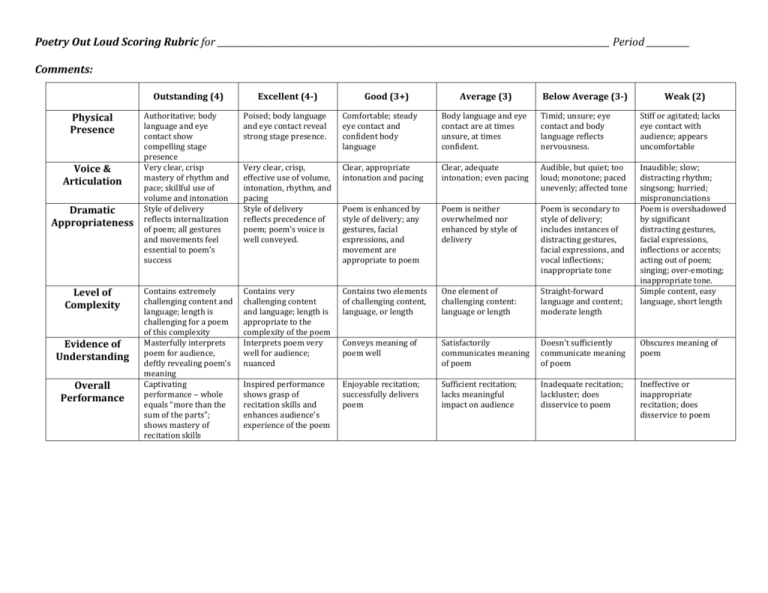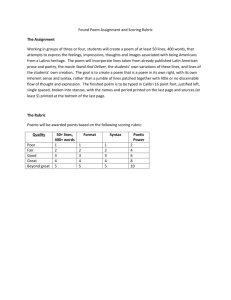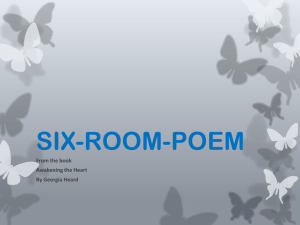Poetry Out Loud Scoring Rubric for
advertisement

Poetry Out Loud Scoring Rubric for ___________________________________________________________________________________________ Period __________ Comments: Outstanding (4) Physical Presence Voice & Articulation Dramatic Appropriateness Level of Complexity Evidence of Understanding Overall Performance Excellent (4-) Good (3+) Average (3) Below Average (3-) Weak (2) Authoritative; body language and eye contact show compelling stage presence Very clear, crisp mastery of rhythm and pace; skillful use of volume and intonation Style of delivery reflects internalization of poem; all gestures and movements feel essential to poem’s success Poised; body language and eye contact reveal strong stage presence. Comfortable; steady eye contact and confident body language Body language and eye contact are at times unsure, at times confident. Timid; unsure; eye contact and body language reflects nervousness. Stiff or agitated; lacks eye contact with audience; appears uncomfortable Very clear, crisp, effective use of volume, intonation, rhythm, and pacing Style of delivery reflects precedence of poem; poem’s voice is well conveyed. Clear, appropriate intonation and pacing Clear, adequate intonation; even pacing Audible, but quiet; too loud; monotone; paced unevenly; affected tone Poem is enhanced by style of delivery; any gestures, facial expressions, and movement are appropriate to poem Poem is neither overwhelmed nor enhanced by style of delivery Poem is secondary to style of delivery; includes instances of distracting gestures, facial expressions, and vocal inflections; inappropriate tone Contains extremely challenging content and language; length is challenging for a poem of this complexity Masterfully interprets poem for audience, deftly revealing poem’s meaning Captivating performance – whole equals “more than the sum of the parts”; shows mastery of recitation skills Contains very challenging content and language; length is appropriate to the complexity of the poem Interprets poem very well for audience; nuanced Contains two elements of challenging content, language, or length One element of challenging content: language or length Straight-forward language and content; moderate length Inaudible; slow; distracting rhythm; singsong; hurried; mispronunciations Poem is overshadowed by significant distracting gestures, facial expressions, inflections or accents; acting out of poem; singing; over-emoting; inappropriate tone. Simple content, easy language, short length Conveys meaning of poem well Satisfactorily communicates meaning of poem Doesn’t sufficiently communicate meaning of poem Obscures meaning of poem Inspired performance shows grasp of recitation skills and enhances audience’s experience of the poem Enjoyable recitation; successfully delivers poem Sufficient recitation; lacks meaningful impact on audience Inadequate recitation; lackluster; does disservice to poem Ineffective or inappropriate recitation; does disservice to poem ACCURACY SCORING: Minor Inaccuracies, resulting in a 1-point deduction for each instance: Confusing a pronoun (“he” instead of “she”) Confusing an article (“a” instead of “the”) Pluralizing a word or vice-versa (“horses” instead of “horse”) Replacing a word with a similar word (“jump” instead of “leap”) Confusing the order of words (“hops and skips” instead of “skips and hops”) Skipping a word Repeating a word Adding a word Major Inaccuracies, resulting in larger deductions per occurrence, include: One line out of order (-2) Repeating a line (-2) Skipped 1 line/Skipped three or more words in the same line (-3) Reversed 2 stanzas (-5) Skipped 1 stanza (-6) PHYSICAL PRESENCE Eye contact, body language, and poise. Tips: Present yourself well and be attentive. Use good posture. Look confident. Use eye contact with the entire audience. Don’t focus solely on the judges. Nervous gestures, poor eye contact with the audience, and lack of poise or confidence will detract from your score. Relax and be natural. Enjoy your poem—the judges will notice. Qualities of a strong recitation: Ease and comfort with the audience. Engagement with the audience through physical presence, including appropriate body language, confidence, and eye contact—without appearing artificial. VOICE AND ARTICULATION Volume, pace, rhythm, intonation, and proper pronunciation. Keep in Mind: Contestants will use a microphone at the National Finals. Tips: Project to the audience. Capture the attention of everyone, including the people in the back row. However, don’t mistake yelling for good projection. Proceed at a fitting and natural pace. Avoid nervously rushing through the poem. Do not speak so slowly that the language sounds unnatural or awkward. With rhymed poems, be careful not to recite in a sing-song manner. Make sure you know how to pronounce every word in your poem. Articulate. Line breaks are a defining feature of poetry. Decide whether a break requires a pause and, if so, how long to pause. Qualities of a strong recitation: All words pronounced correctly, and the volume, rhythm, and intonation greatly enhance the recitation. Pacing appropriate to the poem. DRAMATIC APPROPRIATENESS Recitation is about conveying a poem’s sense with its language. It is closer to the art of oral interpretation than theatrical performance. (Think storyteller or narrator rather than actor.) A strong performance will rely on a powerful internalization of the poem rather than distracting dramatic gestures. You represent the poem’s voice, not a character’s. You must subtly enhance the understanding and enjoyment of the poem without overshadowing the language. Tips: Do not act out the poem. Too much dramatization distracts from the language of the poem. Movement or accents must not detract from the poem’s voice. You are the vessel of your poem. Have confidence that your poem is strong enough to communicate without a physical illustration. Let the words of the poem do the work. Depending on the poem, occasional gestures may be appropriate, but the line between appropriate and overdone is a thin one. When uncertain, leave them out. Avoid monotone delivery. However, too much enthusiasm can make your performance seem insincere. Qualities of a strong recitation: The dramatization subtly underscores the meaning of the poem without becoming the focal point. The style of delivery is more about oral interpretation than dramatic enactment. A low score in this category will result from recitations that have affected character voices and accents, inappropriate tone and inflection, singing, distracting and excessive gestures, or unnecessary emoting. LEVEL OF COMPLEXITY A poem with complex content conveys difficult, sophisticated ideas, that are challenging to comprehend and express. A poem with complex language will have intricate diction and syntax, meter and rhyme scheme, and shifts in tone or mood. Poem length is also considered in complexity. Please keep in mind that longer poems are not necessarily more difficult. Poems with significantly challenging content and language may not need length to score well. Tips: For competitions beyond the classroom level, select poems of various styles, time periods, themes, and tones. Diversity of poem selection will allow judges to see your mastery of various elements of complexity. Make sure each poem you choose is one that speaks to you. If you are able to connect with a poem, that internalization will ripple positively throughout all of your scores. EVIDENCE OF UNDERSTANDING You must understand the poem fully. Be attentive to the messages, meanings, allusions, irony, tones of voice, and other nuances in your poem. Be sure you know the meaning of every word and line in your poem. Listen to track 4 on the audio CD (or in the audio section) in which poet David Mason introduces Yeats’s “The Lake Isle of Innisfree.” He advises you to think about how you should interpret the tone, volume, and voice of your poem. Is it a quiet poem? Is it a boisterous poem? Should it be read more quickly or slowly, with a happy or mournful tone? Your interpretation will be different for each poem, and it is a crucial element of your performance.








